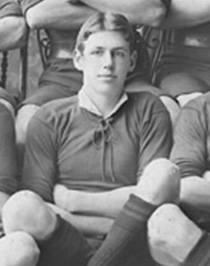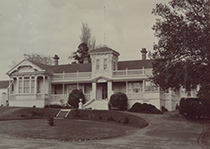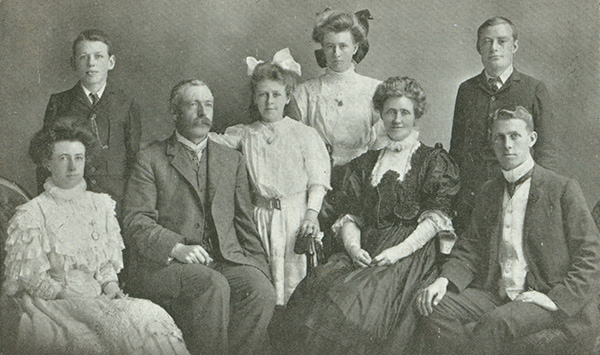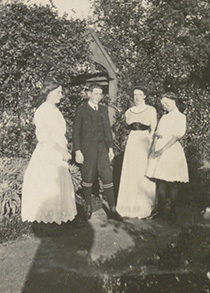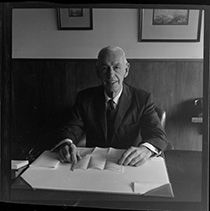‘You have had a long hard spell and we are all proud of the way you have stuck to it and we earnestly hope that you are spared to see it brought to a satisfactory end’.
Sir George Fowlds writing to his son, 10 September 1917.Sir George Fowlds papers. MSS & Archives A-17, volume 1/76. Special Collections, University of Auckland Libraries and Learning Services.
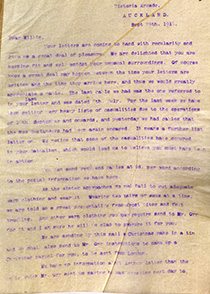
William Fowlds receives fatherly advice in this September 1916 letter.Sir George Fowlds papers. MSS & Archives A-17, volume 1/75. Special Collections, University of Auckland Libraries and Learning Services.
War years
Fowlds was made a 2nd Lieutenant in the 4th Battalion, New Zealand Rifle Brigade and during February 1916 left for Egypt on the troopship HMNZT Mokoia. The ship’s magazine, The Mokoian, records that while on board Fowlds gave a lecture titled Notes from the Front and the Failures they reveal.
Fowlds and his battalion arrived in France in April 1916 and five months later in September 1916 they took part in the infamous battle of the Somme. Fowlds would go on to fight alongside his battalion in Messines and Passchendaele in 1917 and to serve as part of the occupation force in Germany in 1918-1919.
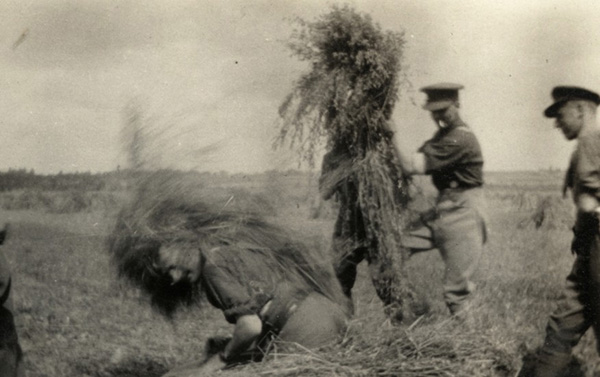 A respite from battle: New Zealand Rifle Brigade officers `skylarking about in a wheatfield, France 1916’. Accession 2001.445.2, Kippenberger Military Archive, National Army Museum Te Mata Toa, Waiouru.
A respite from battle: New Zealand Rifle Brigade officers `skylarking about in a wheatfield, France 1916’. Accession 2001.445.2, Kippenberger Military Archive, National Army Museum Te Mata Toa, Waiouru.
Throughout the war, Fowlds wrote to his father George, whose papers are now housed in Special Collections. The Sir George Fowlds papers include letter books containing copies of his correspondence with William. Although the Fowlds papers do not include William’s letters, his father’s replies provide some insight into his wartime experiences and also into the effect it had on the Fowlds family.
In most of the letters, George Fowlds offers words of advice to his son, such as wearing two pairs of socks to prevent frostbite and being careful not to fall victim to London’s `many seductions and temptations'. The family sent packages and money to Fowlds, including a Christmas cake in a tin. As the war raged on and Christmases without his son came and went, George Fowlds wrote of his concern for his son and his longing to see him back home safely.
It seems that William Fowlds also shared his experiences of hardship with his father and asked that he support his application to transfer to the Royal Flying Corps. George Fowlds in turn sent letters to a number of British MPs asking that his son be considered for transfer. Ultimately, Fowlds’ application was unsuccessful and his father replied to the news with words of encouragement, saying how proud he was of his son.
As the war went on, Fowlds’ dedication and leadership skills were recognised and in November 1917 he was promoted to Captain. A month later, he was mentioned in despatches ‘for distinguished and gallant services and devotion to duty’.
He received the Military Cross in 1918 for ‘gallantry and continuous good service, particularly in the operations against Passchendaele on 12th October 1917, and in the Sector north east of Polygon Wood during November and December 1917 and January 1918’. He showed ‘fine powers of leadership’ and ‘in the most trying circumstances his personal gallantry has inspired his company’.



